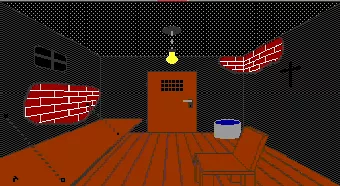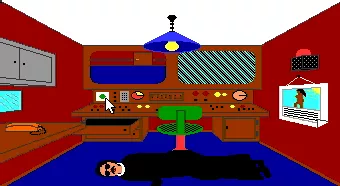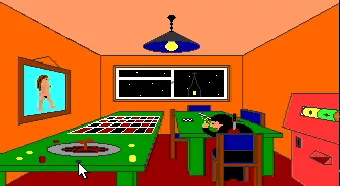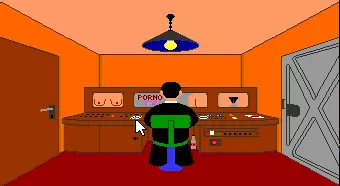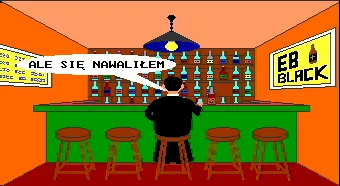Operacja Glemp
Description
Operacja Glemp is an adventure game set in a modified Polish political reality of 1996. The place of action is Kuria, a secret headquarters of mafia called the Episcopate. Poland is ruled by bishops black mafia, under the leadership of godfather operating under the pseudonym Glemp. All state institutions are under the control of the Christian National Union (Union Sick of Hate). Special militias prey on infidels who run partisan activities against the current government. The main character is the agent of the guerrillas. His task in the game is getting out of prison in the basement of grim Curia, murder of several significant for clergy persons, theft of stolen money and shares and blowing Curia in the air, finally safely escape Primate's Mercedes.
The game takes place on the premises, among which the player moves by clicking on the direction arrows. The control mechanism is similar to the classic point & click system. The left mouse button shows the information about the items and sub-options to choose from, right-approve the action. The player must be very careful in making decisions. Every mistake ends up instant death. For example, drinking water from a bucket standing in the cell ends in death caused by typhoid.
Groups +
Screenshots
Credits (DOS version)
| Programming | |
| Graphics | |
| Project |
Reviews
Players
Average score: 2.0 out of 5 (based on 2 ratings with 1 reviews)
The Good
The graphics are of course quite primitive, definitely hand- (or rather mouse-)drawn, however they are colorful and not really that bad. In a few places the game's very heavy humor is indeed funny, such as (seen on one of the screenshots included here) prices for absolution of sins. It isn't very far from truth - while no one expects payment during confession, general stories about greedy priests are ubiquitous.
Steering is slightly untypical, which can be an interesting surprise. Both mouse buttons are used and the type of view is - relatively rare in adventure games - first-person view.
The game "uses" actual people. The "mafia godfather" from the game, titular Glemp, was cardinal Jozef Glemp, primate of Poland (a function that could be described as "first archbishop", head of the national Church) in 1981-2009. He was indeed criticised as a person "glued to his seat", but finally he left his position due to poor health and reorganisation. He died in 2013 - fortunately without any relationship to the game.
The Bad
Nevertheless, the game can quite accurately be described as hate speech or even "satisfying the characteristics of a penal act". While all anger and aggression against the Catholic church in Poland isn't too surprising, the game definitely goes way too far in its presentation of the Church and its "solution to the problem". However, as this context is probably unknown abroad, I will have to offer a longer narrative about the socio-religious situation in Poland to make this game more comprehensible to foreigners.
While the "Pole-Catholic" stereotype is older, only in the last century has Poland indeed become a country of relatively high ethnic and religious homogenity. Tragic events such as the Shoah, forced expulsion of Germans, Masurs and Ukrainians from Poland after the war, and, finally, the anti-Semitic or "anti-Zionist" campaign of the communist regime in 1968 led to a homogenisation of society - mostly ethnic Poles were left, a majority of them Roman Catholic. According to statistics about 90% of the population are members of the Roman Catholic church. However, hardly anyone believes that Poland would avoid the process of secularization (or "declericalization", as a Lutheran minister I know calls it). There are data which suggest that even up to half of these Catholics aren't really followers of the church anymore. Some of them were baptized, but are actually atheists (the apostasy movement is quite active - which is comprehensible since the Church often tries to impede apostasy procedures - and "militant atheists" are extremely loud on the Internet). Others - probably a high percentage - fall into the category of "believing not belonging" or "I'm a believer, but in my own way".
The Church has much influence on public life and actually data show that it did so also at time when the percentage of religious minorities was substantially higher. Common accusations state that the Church itself doesn't respect the agreement between Poland and Vatican (known as the concordate) and that politicians are cowardly, always afraid of irritating the Church. Its influence on public life is clearly visible: crosses in public institutions, religion classes at schools and obstacles for students who want to learn ethics instead, a harsh abortion law and its even harsher implementation (in some cases abortion is legal, but the woman is unable to enforce her right), highly ideological sexual education at schools, numerous abuses at the Estate Commission which awarded churches compensations for property lost in the communist period. Currently the Church is speaking loudly against in vitro fertilization (it hasn't been regulated so far, bishops are exhorting to a ban on this method) and civil partnerships (no such institution in Polish law yet, same-sex couples are legally strangers to each other, yet right-wing politicians enjoy calling such regulations "unnecessary privileges").
Under such circumstances, a reaction shouldn't be considered unexpected. I have grudges against the Church myself - for not respecting division of Church and state, for what I call "extreme materialism" in its views on matters such as homosexuality and transgender issues (which have become a relatively "hot" topic because of all media curiosity surrounding Anna Grodzka, the third transgender Member of Parliament in the world), but also cult of relics. I wouldn't say I "like" the Catholic church despite my general positive stance on religiosity and spirituality. However, while criticism of the Church should be considered legitimate - has to be considered legitimate in a pluralistic society - "Operacja Glemp" takes this criticism to the edge.
For example describing bishops as mafia is, in my opinion, permissible criticism. However, "Operacja Glemp" doesn't stop at this point - the game's objective is to kill important figures of the Church and "clerical" politicians. That is why I said the game "satisfies the characteristics of a penal act" - it could be argued that it simply incites to violence. However, while the author has indeed had a lawsuit, sources say nothing about him actually having been convicted and one could say in defense that the game clearly didn't induce anyone to attempt a murder of Church officials - players probably treated it just as satire and as a way to relieve aggression without even thinking of doing the same in real life. Relieving aggression through controversial games is definitely much better than forcing it inside until it explodes...
The Bottom Line
Some players say all the controversy surrounding the game gave it an undeserved aura of forbidden fruit. Over years rumors accumulated - for example some people state there is a sequel to the game - "much better graphics, and it runs in Windows!" - with new figures who became new "eminences grises" in the Church (such as father Rydzyk, head of the rather infamous, xenophobic Radio Virgin Mary). For some time "Operacja Glemp" wasn't available, but quite soon developers reacted in a standard way: by moving the download link to a foreign server. Now the controversy is long over, could be considered quite obscure - yet some people still say that the game "shows the truth about the Church!". I would advise against playing it - bathing in all this highly exaggerated hatred against the Church is not pleasant. It definitely exceeds fairytale cruelty of typical adventure games - for example I enjoyed "Simon the Sorcerer 2" despite the main character's general rough attitude and dubious scenes such as turning on a torture machine to create a distraction. "Operacja Glemp" is much more full of brutality - several murders, fooling a guard into drinking methyl alcohol to make him blind... The way the Church is portrayed in the game doesn't counterbalance this brutality because such an image is extremely exaggerated and obviously false.
DOS · by Nowhere Girl (8680) · 2013
Trivia
Controversy
As a result of the publication of playing in Gazeta Wyborcza the author was sued. The controversy stemmed from the fact that the game presented a decidedly anti-clerical sense of humor and the Polish Catholic Church was presented in a decidedly negative light. In addition, in the game real figures of Polish public life were ridiculed.
Analytics
Upgrade to MobyPro to view research rankings!
Identifiers +
Contribute
Are you familiar with this game? Help document and preserve this entry in video game history! If your contribution is approved, you will earn points and be credited as a contributor.
Contributors to this Entry
Game added by Karsa Orlong.
Game added February 13, 2013. Last modified February 22, 2023.
